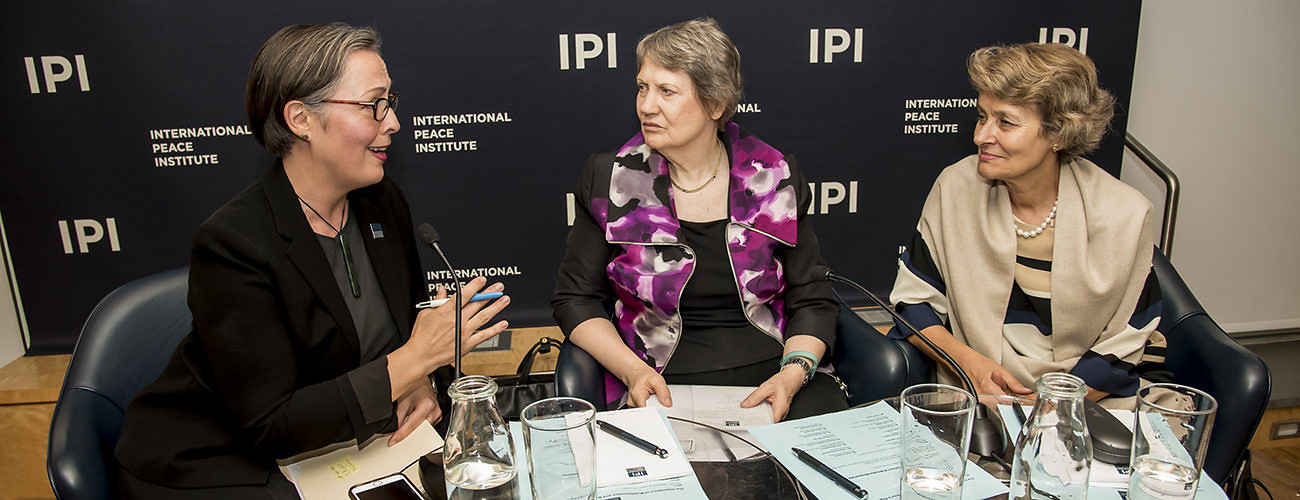Women’s rights are increasingly facing pushback with global trends towards populism and shifting centers of power. This pushback is also occurring at a time when preparations are being made to mark the anniversaries of key international commitments to women’s rights in 2020, including the Beijing Declaration and Platform for Action and Security Council Resolution 1325 on Women, Peace, and Security.
A September 26th discussion at IPI between Helen Clark, Former Prime Minister of New Zealand, and former United Nations Development Programme (UNDP) Administrator, and Irina Bokova, former Director-General of the UN Educational, Scientific, and Cultural Organization (UNESCO), focused on these challenges and possibilities for a way forward. Speakers drew upon their experience to discuss women’s rights amid the current geopolitical context, the deeply gendered nature of current threats to multilateralism, what these geopolitical trends mean for building peace, and how to ground the multilateral system in respect for women’s rights and equal status.
In opening remarks, IPI Vice President Adam Lupel declared that “It should go without saying, I would think, that ensuring a robust and effective multilateral system requires the equal status and participation of what amounts to 52% of the population.” But, he said, “somehow it doesn’t.”
Sarah Taylor, IPI Senior Fellow, cited the Open Letter of the Group of Women Leaders for Change and Inclusion that addressed this problem. This group, whose leaders include Ms. Clark, Ms. Bukova, and Susana Malcorra, former Foreign Minister of Argentina and Chef de Cabinet for UN Secretary-General Ban Ki-Moon, came together earlier this year to “collectively call attention to the need to achieve full gender equality and empowerment of women across all ambits of society and the critical importance of multilateralism as a vehicle in support of that.”
Ms. Clark highlighted the fact that since the March 8th formation of the women’s group, people singled out attacks of populist nationalist leaders on the international system, noting also that the same people tend to be attacking women’s rights at home.
“We, as a group, believe that the multilateral system has been incredibly important for establishing women’s rights as a huge priority,” Ms. Clark continued. “Therefore anything that undermines the multilateral system is bad for women, because we look to the multilateral system through its treaties, conventions, declarations, commissions, organizations, to uphold and promote women’s rights.”
Ms. Clark cited the UN’s long history of multilateralism and women’s rights, but noted that the debate on women’s sexual health and gender identity is undergoing great change. “Frankly there’s a much broader conversation that’s being had,” she said, about how “it is a right of anybody to express their gender identity however they want to express it, and to have their dignity upheld as an individual.”
Ms. Bokova, described how as a young diplomat, she encountered debates as to whether discrimination against women was considered a human rights violation. Despite progress towards gender equality, she said, “we are [also] seeing a lot of setbacks.”
Ms. Bokova added that we must “go broader,” when it comes to issues such as women’s health. “It’s not just an issue of women’s equality, it’s an issue for community engagement, it’s an issue of health.” Her recommendation for a broader approach was to “present the agenda not just as an ethical framework for women, but as a societal problem that is linked with the overall well being of communities of countries.”
Ms. Bokova emphasized the urgency of addressing women’s rights and multilateralism. “We are really at a critical point,” she warned, “Either we do something, raise our voices, mobilize, in order to move forward and to once again bring the agenda to the multilateral system as a priority, as unfinished business, as an accelerator to peace and sustainable development, or we just will not live up to the expectations of so many women in the world.”
María Elena Agüero, Secretary-General of the Club de Madrid, noted the effectiveness of “multilateralism that delivers.” She said her organization aimed to bring together democratic former heads of state and government from all over the world, and that she had tried to have as fair representation and distribution as possible.
However, Ms. Agüero said, creating a gender balance had been held back because there have been too few women heads of state. Equality, though, is not only a task for the Club de Madrid, she added, but society writ large. Ms. Agüero pointed out that the numbers of women leaders are increasing, so “let’s make this happen.”
Dr. Taylor moderated the discussion, and in concluding remarks said, “Gender is implicated in the political movements that reject multilateralism and strive towards isolation, including through efforts to control women’s bodies; violations of women’s rights are part of the ways in which conflicts are justified and fought; and gender equality and robust adherence to women’s rights standards—including women’s full participation in decision-making—are fundamental to strengthening the multilateral system.”








